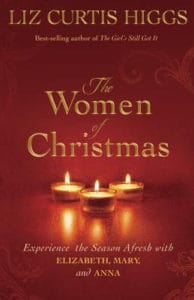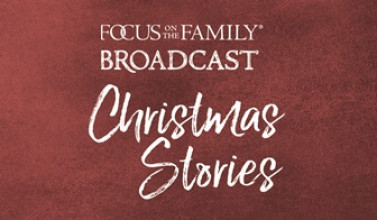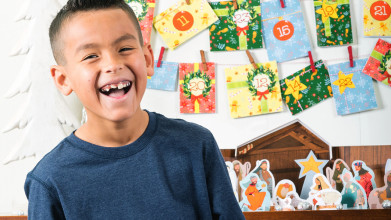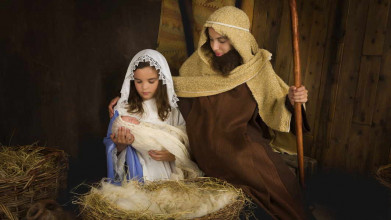(Christmas music)
John Fuller: Well, can you believe it? It’s already Christmas time. And for some, it’s a blessed season, for others, well… it’s a busy season. And if you haven’t yet gotten into the true spirit of Christmas, you will, after hearing today’s Focus on the Family with our president, Jim Daly, and I’m John Fuller.
Jim Daly: John, I’m about footballed out. I love football, that’s my weakness.
John: Are you not turkeyed out?
Jim: I can eat turkey all day long.
John: Turkey and football, yay.
Jim: Jean has little to-do list for me, though. Like time to put the lights up and all that kind of thing. So, this time of year, is usually pretty busy. But you know what we want to talk about today? Kind of the true meaning of Christmas, what’s it all about? And I think we’re going to talk about a very unique topic today that puts a smile on God’s face.
And we have a special guest to do that. Liz Curtis Higgs is joining us. She’s right here in Kentucky. We happen to be in Kentucky today.
John: Yeah. It’s great to be on the campus of Asbury University.
Jim: It was.
John: What an awesome facility. But even better than all the structures and the great equipment they have, Jim, are the people. There…
Jim: Yeah.
John: What wonderful hosts they’ve been for us here.
Jim: Well, for years I’ve heard so much about this university and I can tell you, they are special people. It’s a great place. Uh, Liz has written many books, usually about girls. She’s written The Bad Girls of the Bible, and Slightly Bad Girls of the Bible. And then Really Bad Girls of the Bible. But now we’re going to talk about the girls of Christmas. Really, The Women of Christmas. And Liz, it is great to have you with us.
Liz Curtis Higgs: Oh, it’s a blessing to be here. Yeah. These women actually, of course qualify as good girls of the bible.
Jim: The good girls.
John: Finally.
Liz: The question was, could I handle it, you know, could I do it, yeah.
Jim: No, that’s great. Now let me ask you, with Christmas right around the corner. I mean, we’re at the end of November here, and Christmas is staring us down. We’re thinking already about all the to dos.
Liz: Yeah…
Jim: But what’s a special part of Christmas for you? What do you think of that puts a smile on your face?
Liz: Oh, well, I’m all about the music, I have to be honest. And all the music that leads up to Christmas. And personally, I don’t think you actually get to play it till today.
Jim: Oh, is that right?
Liz: I like to give Thanksgiving it’s due and have November be about Thanksgiving. But now, officially, we can play Christmas music right up until the day. And uh…yeah. It’s just always the words are so precious. The older, uh, Christmas carols are so rooted in the Word. And there’s so much joy in the music.
Jim: There is.
Liz: The joy of anticipation.
Jim: I think the Lord, I mean, he loves worship. And when you worship with your heart, I think it really does. He smiles with that. Let’s talk about the book, The Women of Christmas. It’s Elizabeth, it’s Anna, and Mary. How did you come to the realization that these are women of Christmas?
Liz: Right. Well, you know, obviously Mary seems to be the woman of Christmas.
Jim: Right.
Liz: That would be rightly so. But when you look into Luke, you realize, wait a minute, there’s another woman before we really meet Mary, we meet Elizabeth. Of course, that’s my name. So, I’ve always been kind of partial to that.
But her story is so amazing. And then you put it next to Mary’s, and you see the things that are the same and the things that are very different. How God would use two entirely different women in his plan.
Then you come along and here’s Anna. These three women are three different generations. Mary would have been 12 to 12 and a half.
John: It is, yeah.
Liz: It is hard to get your head around that. But young women were betrothed as soon as they were able to have children. So, she was 12 to 12 and a half years old.
Liz: So young. No Bible movie has ever had her young enough, you know, because we just almost would, couldn’t bear the thought of a child.
Jim: That’s almost there, that, that still is shocking though. I hadn’t thought of Mary. I thought of her more like 14 or 15.
Liz: No, not likely. More like 12 to 12 and a half. And then Elizabeth’s age is not given, but, um, she is old in years. Yeah, that’s a lovely phrase to hear. Old in years.
Jim: I’m feeling like that.
(Laughter)
Liz: Me too! Me too. Past childbearing. Past her fertile years. And so, somewhere she could be 40 or 50 or 60. We’re really not told. Then with Anna, you get a very specific age, 84. I love that. The Bible is so clear. I don’t know how I feel about that with Luke. I’d like to talk to him. Was there a reason you had to mention your exact age?
Jim: Well, he’s a doctor. He’s a doctor, he’s filling out the chart.
Liz: I think he was impressed that she was doing so well at 84. But so, you have three different generations, three very different kinds of women. And yet they’re all sewn into the story of the coming of Jesus. And it’s just like God to do that, to say he has come for everyone.
Jim: You, you know, Liz, the other aspect of the book that was really intriguing and right is, um, the story behind the story. So often, we read scripture kind of in a sterile environment, expecting these people to do everything correctly. They heard God when God spoke. They… they didn’t mess up in that relationship. But what you’re bringing out in the book is Mary is a 12, 12-and-a-half-year-old unmarried girl.
Liz: That’s right.
Jim: And what that environment probably was really like for her and Joseph. Very different. Talk about that because I’d like to talk to my boys. I’d like to talk to them about that setting and not make it so sterile. Does that make sense?
Liz: No, it’s exactly right. We have to understand in these small towns that they lived in, a young girl, and of course she hears from the angel Gabriel, shows up and says “Ta-da.” That’s the LRV version
Jim: Is it the (unintelligible) version?
John: (Laughing)
Jim: What exactly did the angel say?
John: The LRV. I like that.
Liz: LRV – Lizzy Revised Version. But you know, he says, you know, this wonderful news, which she receives with such a purity of faith. So pure/ “Be it done unto me, your maid servant.” Incredible. And then she takes off for Elizabeth’s. That’s exactly what I would do if I found out I was going to be pregnant, was get out of town. So, she goes to see her cousin Elizabeth and she’s there about three months. When she comes back home, she’s very pregnant. She’s now three months pregnant. She would be showing as it were. She’s been apart from Joseph. So, the question would have been, of course, whose baby is this?
Jim: Huh.
Liz: And we often just think that she was welcomed back to town and everybody was thrilled because she was going to have the baby Jesus. That is not what their perception would have been. Their perception would have been, “Oh, you had a visit from the Holy Spirit? Well, happens every day.” (chuckling)
Jim: Right.
Liz: No, it hadn’t happened. He hadn’t appeared in 400 years.
Jim: Well, and I think it would be in that category of unbelievable. Here’s a scared girl trying to make up a story to protect herself.
Liz: Right. Exactly. So… and for poor Joseph. What is he going to do with this? He was betrothed to this girl – as good as married. And, here she comes, she’s pregnant. He doesn’t know if it’s his… Well, he knows it isn’t his child. He’s very sure of that.
John: That’s a good way to put that. I like that emphasis.
Liz: Right. He knows it isn’t his. And he has to figure out what to do. Now, so many points to Joseph, because he could have been harsh on her, instead he is loving toward her, and wants to quietly divorce her. Well, we have to understand this. The other option was that he could have joined the community in stoning her. Right?
Jim: Think of that. Yeah.
Liz: It would have been, she would have been seen as an adulterous. And so, she would have been stoned. That was the normal option. But because Joseph was such a good man, and by the way, he never speaks in this part of the story. Isn’t that something? We never hear his voice. Mary talks a lot. Elizabeth talks a lot. Zachariah used to talk, then had his voice taken away. It’s interesting. The men are very quiet.
(Laughter)
John: Still indeed, perhaps.
Jim: Maybe, the Lord knew that we would put our foot in our mouths or something.
Liz: Well, I do think it’s kind of wonderful that the women are highlighted throughout the story of the birth of Jesus. They are definitely front and center to the story.
Jim: Well, let, let’s come back to Mary in just a while, but let’s go to Elizabeth. You talk about the generational aspects of it. So, we got the picture of Mary this 12, 12-and-a-half-year-old girl who’s pregnant, but not married.
Liz: And poor and uneducated.
Jim: And poor and uneducated. Then you have Elizabeth. Talk about Elizabeth.
Liz: Well, she was neither poor nor uneducated. She was the wife of a priest and grew up in a priestly home. So, she would have been of a higher socioeconomic level. And it says in the Bible, “Both she and Zechariah were righteous in the sight of God, deserving of all the Lords … Observing all the Lord’s commands.” In other words, this was that couple at church that just does everything right. That everybody looks up to.
Jim: They sparkle.
Liz: They sparkle. Well said. But… this is one of those big biblical buts. They were childless.
Jim: Hm…
Liz: And they were older. And anytime I teach on this, you can see in the audience, the women whose hearts sank, because they’ve been down this road.
Jim: You can see it in their faces.
Liz: Absolutely. That just that they understand, better than any of the rest of us, what that disappointment month by month by month, that disappointment is like. And here are these two good people doing as it were everything right before the Lord. And how often do we get in a situation where it’s like, “Lord, I’m doing everything right. Why can you not answer this prayer?”
Liz: And of course, God knows the rest of the story. He knows what’s coming for Elizabeth. But it’s a timing thing. If her baby, who will, of course, be John the Baptist. And she doesn’t know that. You always thought she doesn’t give birth to and say, “Oh, look John the Baptist.”
Jim: Right.
Liz: But we know. And God knew. And the timing had to be perfect for John to lead the way for the baby Jesus. Elizabeth couldn’t have had that son when she was 20. It had to come now. And it had to come miraculously. I love that part of it. That this baby was not any work of, as it were, Elizabeth and Zechariah. It was God’s kindness to them and God’s blessing.
Jim: Well, it reminds us, too, that God’s timing is perfect.
Liz: Perfect.
John: Yeah. It doesn’t always feel that way. Of course,
Liz: Oh, it sure doesn’t
John: Liz Curtis Higgs is on Focus on the Family with Jim Daly. I’m John Fuller. And Liz, right there… this is a season that is full of disappointment. You just expressed a little bit of that when you speak, you see it on the women’s faces and hearts about being childless. This is a tough season for a lot of folks because they’re doing everything right. Um, what encouragement can they find?
Liz: Well, this is why I love to study the word of God and the people in the word of God. Not a one of them is perfect. The only perfect person in the Bible is Jesus. So, all of them have flaws and challenges. And I think they give us hope. Uh, and this story is a great one to look to for hope, um because God is ever at work. Um, and who knows what he has for us next? What we do know for a fact is that it’s good.
John: But it didn’t feel good for Elizabeth…
Liz: No…
John: …and her husband as month after month turned into year after year.
Liz: Right. Right.
John: At what point do you just say, “I guess it’s not going to happen?”
Liz: Well, I think in some ways, and this is just the Lizzie opinion, it’s good to come to a place of acceptance that it might never happen. I’m thinking only in my own life when I didn’t marry for many, many years and I got past 30 and there was still no man in my life. And I finally said, “I will be happiest if I come to the acceptance of this is what God has for me is singleness.”
Liz: And so, I jumped into singleness with both feet. Loved it, found every good thing about it. And then I met Bill. But I know that the Lord wanted me to come to that place of peace. That he had this. And if what he had for me was singleness there was a good reason for it. And so I would say, and this is a hard word, that if right now the desire of your heart is to have a child that you’ve got to trust God’s timing in this, and his big plan for you. We just don’t know what’s next, but we know that he’s got it and it’s good.
Jim: That can be tough often because, uh, you know, again, you’re wanting that anticipation.
Liz: Of course.
Jim: And you sense that God will answer your prayers. But like Elizabeth, as you tie it to the story, she went years sitting in her synagogue thinking, “Lord, why aren’t you blessing me?” I’m sure in the quietness of her heart.
Liz: Of course.
Jim: And there are women that are experiencing that right now at Christmas and hoping for that little package. But I like what you said in terms of peace. That you need to seek God’s peace in that. That’s what this season is all about, isn’t it Liz? In our eternal heart, in our expectation heart, what we want in this life, resting in Jesus and in your relationship with Christ is the only true thing that we can trust in.
Liz: For sure. This season is the best of times. And the worst of times. For people who have a happy family that they’re with and the anticipation of Christmas day and lots of gifts and lots of food, well, it’s just grand. But many, many, many of your listeners are not going to be in that place right now.
Jim: Yeah.
Liz: They are not going to have the money to do Christmas the way they’d like to. They are estranged from family or physically apart from family, or there is no family. And so, this is why we remember what Christmas is all about. It’s about Jesus.
Jim: It is. And let’s take it forward. Now, talking again about Mary because I want to go a bit further. That connection to today’s teen girl.
Liz: Mm-hm.
Jim: I mean, you draw that conclusion in the book. You talk about how Mary is that type of teen girl-
Liz: She is.
Jim: Must’ve been struggling. Of course, she had the word of the Lord in her heart. She heard the angel and that made all the difference. But talk to that teen girl who is maybe pregnant…
Liz: Wow, yes.
Jim: … is not married today.
Liz: Right. Okay, first, this really important word. Every baby is a gift from God.
Jim: Hm.
Liz: None of them are unexpected. None of them were a surprise to him.
Jim: Yeah.
Liz: Maybe the conception and the way all of that came down is not how society, or even we would wish it to happen. But now here’s coming this baby. Here’s coming new life. And it’s a chance for us to be changed just as that child is going to change the world they’re born into. And so, um, it is hard. And Mary was the worst-case scenario in the sense that she was very young. She was poor. And while she heard from the angel, nobody else in town did. And so, she knew in her heart that she was right, but everybody else would have seen her as wrong. So, where would she have turned? Only to the Lord. Only the Lord would have understood completely what was going on. What a child, really child of faith she was, to throw herself at his feet and say, “Well, Lord, nobody understands, but you understand.”
Jim: That is so good and so true. And what a great opportunity for the church to be present in that girl’s life.
Liz: Absolutely.
Jim: Let’s talk about the special gift and not to resent that baby inside of her. If you’re in that spot today and you happen to be listening to Focus on the Family, call us, because we’d like to talk to you about next steps and good steps and steps that you won’t regret for the rest of your life. Steps that bring life into this world. Our counselors are here, and we hope if you’re in that position, you will call us and let us help you.
Liz: Right. And there’s also, I, I think of this time of the year, maybe because I spent so many years there in my twenties and then into my early thirties, as a single, not married woman, this can really be a hard time of the year.
Jim: Right. Not just for teenagers.
Liz: No, not just teenagers and not just widows. If you have never married, Christmas is so hard. You’ve got to go to somebody else’s house where they’ve got a husband and they’ve got kids. And then you leave with your packages and your arms and you go home to an empty apartment. I remember doing radio on Christmas many years ago. I’ll tell you how long ago it was. We had records. You know, vinyl. Hole in the middle of it.
Jim: Yes. You’re spinning the records as a DJ if I remember right.
Liz: I was exactly. In Louisville, Kentucky, where still live. But I was alone in the studio, practically alone in the building. The only people that would come in on Christmas morning is the on-air personality. And going home to an empty house and all of that. But I’m spinning the records and I’m crying. And I said, “Lord, I’m so alone.” And he said, “Beloved, you are never alone. I am with you, always.” That was so comforting to me. And so of course the next song I queued up was, “Joy to the world, the Lord has come.” And I just remember having my own little worship experience on that Christmas morning as a single, not married woman, knowing that you’re never alone. Isaiah 54:5 says, “For your husband is your maker whose name is the Lord of Hosts.”
Jim: Liz, let me ask you about this connection between Mary and Elizabeth and when they meet and it’s recorded that John the Baptist in Elizabeth’s belly, leaps. I mean, she can feel this expression within the baby in her womb.
Liz: Oh, that scene.
Jim: When you think about that, and you have doubts about maybe your pro-life position. Here the scripture is very clear talking about the worth of that baby in the womb with what John the Baptist is expressing.
Liz: Right.
Jim: Talk about that moment and what’s happening there.
Liz: Well, this is such an incredible scene and here comes our Mary who, uh, has been told that she will be pregnant. We don’t know, by the way, exactly when that conception occurs. Whether it was the moment that Gabriel was there, on her trip to see her cousin. She traveled a long way. Between 75 and a hundred miles by foot.
Jim: Pregnant.
Liz: Probably yes. We’re thinking somewhere along the line. And by the time she gets there, 10, 11, 12 days into this, she’s definitely pregnant, because Elizabeth says, “Blessed, are you among women! Why would you come see me?” And this is her cousin. And cousin in the Bible means, vaguely, relatives. Anybody that was close to you at all, is your cousin of your cousin of your cousin was still your cousin.
But the baby leaps in her womb and Elizabeth, and of course, John the Baptist, are filled with the Holy Spirit. So, this is happening with this child in utero. And that’s how Elizabeth knows, “She’s it, she’s pregnant.” And this is what I love. This is when Mary would have found out she was pregnant. Think about it.
Jim: That was her pregnancy.
Liz: 12-and-a-half-year-old girl, how would she know?
John: This was the confirmation.
Liz: This was her. This is it. It happened! Just as God said, it happened. But Mary hasn’t even had a chance to tell her yet. That’s what’s so amazing.
Jim: Ah.
Liz: Elizabeth has this revelation from God when the Holy Spirit fills her, he also tells her, “Here’s the deal.” And these words just pour out of Elisabeth’s mouth. I’m sure without any awareness on her part or any pre-thought for that matter. I would guess she didn’t even know Mary was coming. How would she know?
Jim: Right.
Liz: Mary just up and decided to go see her. So, uh, it was a surprise to find her at her door. And a bigger surprise to find out she was A, pregnant and B, with Jesus. Then Elizabeth does a beautiful thing. “The mother of my Lord,” she calls her. The mother of my Lord. So, this is Elizabeth’s moment of making a profession of faith right there.
Jim: That’s a beautiful way to think of Christmas.
Liz: Yes.
Jim: You know, the coming of Jesus. Let me ask you about those years we know nothing about. Just speculation, I understand that. There’s not much there in scripture. But shortly thereafter, both Jesus and John the Baptist would be born, and diapers are being taken care of. And you know what, as a mom, yourself, what’s your heart about those growing up years? You have these experiences. Think of Mary. I mean, being told by the angel of God this is who the child is inside of you. And yet, you know, all the normal stuff of motherhood is right around the corner. I’m sure it was hectic. Mary wasn’t experienced as a mom.
Liz: No.
Jim: Nursing the baby, feeling tired, all the things that would be normal. How, how do you think she felt as a mom?
Liz: Well, I think she had the extra burden of wondering what her neighbors thought of her. Because…
Jim: Always.
Liz: … always. That would always have been there. This uncertainty about who the father of this child was. And so, that I think she might’ve felt a bit more isolated than some young moms might. In a community like that, where usually everybody gathered around to raise a child.
We aren’t told those years. And I always say, if the Lord tells us, we need to know. And if he doesn’t tell us, it’s not important to the story. And so, I tend not to speculate about what happened except to say, she was a mother who stayed very involved in her young son’s life because she’s still there later. And she’s still there later. This is the same Mary who, in a manger had her son, saw him nailed to a cross. The same Mary. And still would have been quite a young woman when that happened to say goodbye to her son. So, about 45 years old. So, she is quite something to me.
Jim: Liz, let’s talk about Anna.
Liz: Oh, I love Anna.
Jim: Because she’s the 84-
Liz: She makes me feel young – just started!
Jim: She’s the 84-year-old woman, the woman full of wisdom in this story.
Liz: Right.
Jim: A lot of people probably are thinking, “Who’s Anna,” because we don’t catch her so clearly. Who is Anna?
Liz: Right. Once the baby Jesus is born, it’s like, “Yay.” And now New Years, right? But the truth is, Anna was a woman who, and I just loved this. She lived in the temple and she worshiped God day and night. So right off the bat, I’m intimidated. What a woman. She was widowed at a very young age. That’s another kind of pain this time of the year, by the way-
John: First Christmas.
Liz: First Christmas of loss is a very difficult time. But so that’s Anna. She had lost her husband as a younger woman, probably in her twenties. And now all these years, she has served the Lord. So, it’s just thrilling to me to see this older woman still on fire for the Lord, excited to tell people, “Jesus is here.” She is a real role model for any of us who are past the child-bearing point. And, you know, even past Elizabeth’s age. But thinking, “What do you have for me, God?”
Jim: Huh.
Liz: Is there more for me to do for you? I’m coming into my sixties, my seventies, my eighties. What can I do? Well, there’s Anna, our incredible role model who’s still going for it for God at 84. I love her.
Jim: That’s a good point though, that as we get older, we can lose that excitement about our faith. And you’re right. Anna is a wonderful example for us to stay in tune with God’s heart, right?
Jim: Yeah.
Liz: Right. Anticipating. She was anticipating the arrival of Messiah all those years. And I love to find the women that we know a little bit less about. Um, truly, we just think of Mary when you think of Christmas, but Elizabeth and Anna on either side of the story in Luke give us the bigger picture that God speaks to each generation. He uses people of each generation for his good purpose.
Jim: And it is so clear the way that you’ve drawn it into your book. When you, Liz, when we look at Christmas, we’re coming in now and we think of the big picture here. I’d like to hear from you. Writing The Women of Christmas, what’s the core message? What would you want to say to that woman who’s struggling? Maybe as a teenage girl who’s pregnant. Maybe as Elizabeth, who hasn’t yet seen her womb come alive, or maybe just has. Or Anna, the 84-year-old, who’s saying, “Lord, my husband’s gone. What do I do at the rest of my life? What do you want me to do?” Communicate directly with them. What would you want them to remember about the special time of the year?
Liz: Jesus came for you. He came for you wherever you are in your life. He came for you. God, all through history prepared for this day, knowing what Jesus coming would do for every one of us. And what he brings is hope. What he brings is a joy that’s rooted not in circumstance, but in a relationship with him. And I love that he speaks to every heart. The 12-year-old girl, the 16, the 20, the 30, the 50, the 80. He has a message of love, acceptance, and salvation. Jesus came for you.
Jim: Yeah. That is so well said. And I would think the core message there, don’t let the busyness of Christmas…
Liz: Oh, yes. But…mmm.
Jim: … obscure your ability to see the true meaning of Christmas…
Liz: Right.
Jim: … which is far bigger than that package.
Liz: Far bigger. Yeah, because you know, the day after Christmas can sometimes be a bit of a let down because of all the buildup tends to be around the gifts and the food and the fellowship of people. And so, I think if you can put the Christ at the center of your Christmas now, beginning today, as we are moving into Advent and carry that as the heart of your Christmas, that means on December 26th, you’re still full of joy.
Jim: Absolutely. And hopefully throughout the whole year.
Liz: That’s right.
Jim: Liz Curtis Higgs author of the book, The Women of Christmas, thanks for lightening our Christmas ideas and thoughts as we start this advent season.
Liz: It’s a blessing.
John: We’ve heard some great insights from Liz Curtis Higgs today about the Christmas story. And I hope that you found this time to be inspirational and that you get a copy of Liz’s book, The Women of Christmas.” The subtitle is Experience the Season Afresh with Elizabeth, Mary, and Anna.”
We’ve got the book here at Focus on the Family, and we’ll send a copy to you when you make a generous donation to this ministry and partner with us to encourage and give hope to others.
Jim: And let me add this John, you don’t want to miss a special opportunity right now to double your support for families. When you give today, your support will go twice as far to give hope to those families.
Let’s end with this thought, because we’ve talked about a lot of joyful things today, as well as a lot of heavy things. And we don’t know exactly where you’re at. As Liz mentioned earlier, this can be a really heavy time of year for people because all the wounds and emotions that can come up. If you need someone to talk to call us and let us pray with you or share a resource with you. This is really what Christmas is about. Being there for others as Jesus was there for us.
John: So, donate, get in touch with us to schedule a counseling appointment. Request Liz’s book. Our number is 800, the letter A and word FAMILY. Or online you’ll find the help you need at focusonthefamily.com/broadcast.
Well, thanks for listening today, to Focus on the Family. On behalf of Jim Daly and the entire team, I’m John Fuller, inviting you back tomorrow as we start our annual tradition of presenting some of the best programs from the year as we once more help you and your family thrive in Christ.























